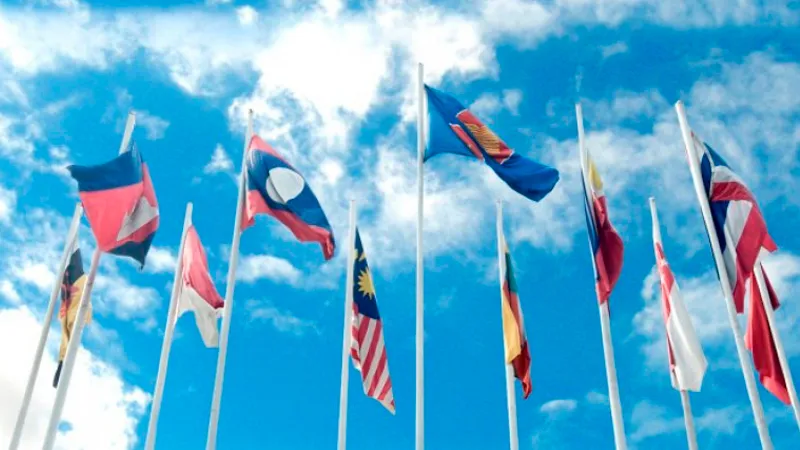The India-Association of Southeast Asian Nations (Asean) relationship received a shot in the arm with the conclusion of the 8th edition of the Delhi Dialogue this February after two days of deliberations on the theme “India-Asean Relations: A New Paradigm.” The forum was all encompassing and centred on politics, security, economic and social cultural issues between the two sides.
India-Asean relations go a long way back. However, in 1991, India decided to aggressively increase trade and strategic relations with South East Asian Countries as part of its “look east” policy. The aim was to build historical and cultural ties to expand markets, counter Chinese influence in the region and improve India’s standing as a regional power.
But India’s relationship with its regional neighbours has not matured to the extent that it was originally envisaged. Undoubtedly, a stronger standing at Asean will give a major boost to India’s stature as a growing global power, which it cannot accomplish without first becoming a regional player.
In 2008, before the conclusion of the India-Asean goods free trade agreement (FTA), the India-Asean annual trade was only US$30 billion. Since India concluded the goods FTA with Asean in 2009, trade has increased consistently though the potential has not been fully realised. Asean is India’s fourth largest trading partner after China, EU and the US. The two way trade between the between the two regions touched nearly $80 b in 2014-15 though the expected potential was set for $100 billion by end of 2015 and $200 b by 2022.
Investment flows have also substantial both ways, with Asean accounting for approximately 12.5% of investment flows into India since 2000. The FDI inflows into India from Asean between April 2007-March 2015 were about $32.44 b. Whereas FDI outflows from India to Asean countries, from April 2007 to March 2015 was about $38.67 b. The Asean-India FTA is now complete with the entering into force of the Asean-India Agreements on Trade in Services and Investments on July 1, 2015.
India has an annual Track 1.5 event Delhi Dialogue, for discussing politico-security and economic issues between Asean and India. Since 2009, India has had eight editions of this event.
The 8th edition of Delhi Dialogue was hosted by the MEA in partnership with IDSA, FICCI and other select Indian and Asean partners on 17-19 February 2016 in New Delhi. The dialogue focused on several issues and had a business section, a ministerial session and also an academic session.
The dialogue dwelt on the steps to be taken by both India and Asean to smoothen the conclusion of the Regional Comprehensive Economic Partnership (RCEP) negotiations by the end of 2016. It also discussed the implications of the recently concluded Trans pacific partnership (TPP) for the region. In the backdrop of the TPP, the officials said that fast conclusion of the RCEP would deepen integration among the member countries and also help promote goods and services trade, investments, IT, competition and disputes settlement among the member countries.
Global value chains
The dialogue provided an opportunity for New Delhi to assess how it would need to adjust to the mega FTAs and other non-informal blocks such as the One Belt One Road (OBOR) initiative emerging in the region which are important from both India’s security and economic future.
One of the major issues for India is the need to join the global value chains. The dialogue also discussed the steps already undertaken for better coordination with Asean on the industrial value chains.
The Ministry of External Affairs in the dialogue explained the setting up of the Rs 500 crore project development fund to encourage integration of Indian producers in the regional value chains of Asean. This initiative, the government said, will help create manufacturing hubs in Cambodia, Lao PDR, Myanmar and Vietnam leading to the establishment of a new regional economic order within Asean.
All outstanding issues required to boost relations between the two partners was discussed in the dialogue including regional value chains, reduction of tariff and non-tariff barriers, reducing trade impediments, trade facilitation and steps to increase intra-regional trade by focusing on boosting both exports and imports.
Discussion also centred on ways and means to help small and medium enterprises to become a part of the regional value chains and ensure that they have information and clarity on export procedures and norms given the fact that each country has separate and individual agreements with each other apart from being part of mega FTAs.
The dialogue also highlighted the gains to India’s service sectors because of the conclusion of India-Asean Services agreement and the RCEP. There was a general consensus that India would stand to gain from the scope in the services sector that the mega trade blocs provide.
The growing strategic partnership between India and Asean is a positive development and needs to be further strengthened with a consistent engagement with the Asean member countries. Both Asean and India need each other. For Asean, India not only offers a huge domestic market with growing aspirational middle class but also a growing working population which is not the case with other economies such as Korea, Japan or China where the working population is on the decline.
Focusing on trade in services with Asean will give India an opportunity to use its competitive strength to become a services export hub to the Asean region. Further, being a part of the AEC (Asean Economic Community), RCEP and having strong relations with Asean through the existing FTA will not only facilitate further economic reforms in India but also assist the country in establishing itself as a growing economic power in Asia.
This commentary originally appeared in East Asia Forum.
The views expressed above belong to the author(s). ORF research and analyses now available on Telegram! Click here to access our curated content — blogs, longforms and interviews.




 PREV
PREV


